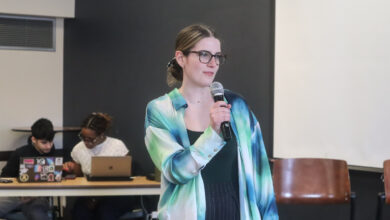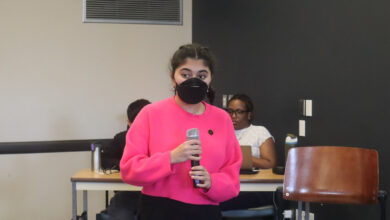Admitting you need help with your mental health isn’t a weakness
 Ashton Mucha
Ashton MuchaLast week, while agonizing with my best friend for the millionth time over my decision to take mood drugs to deal with my ongoing and worsening mental illness, she said something incredible and tender and funny that I’d never heard before and have been thinking about nearly constantly since:
“If you can’t make your own, store bought is fine.”
I asked her what she was talking about, and she meant neuro-transmitters (don’t ask me, I’m not a doctor). She went on to explain to me that moods are like cookies (bear with me, here). Some people are excellent bakers and can consistently make delicious cookies whenever they want or need to. Other people (people like me) are just okay bakers. Sometimes, our cookies are soft and chewy and incredible, and other times they come out of the oven a charred mess. We can choose to go to the bakery and buy cookies. It might take us a while to find our favourite kind, but when we do it’s likely that they’ll be consistent (if perhaps not as great as our good-day cookies). We can still choose to make cookies (or even not make cookies) if we want to, but there’s no shame in store-bought if we don’t.
I started to consider this analogy in the broader context of the university, which I have increasingly come to see as an institution that has no real interest in the wellness of its students. I am certainly not the first person to write here on the empty rhetoric the university employs to deal with “Student Mental Health.” While pushing to “break the stigma” and “seek help if you need it,” the university in fact produces “poor” mental health due to high workloads, intense financial strain, a lack of accessible resources, and increasing pressure for students to be “well-rounded” with volunteer experience, work experience, and extra-curriculars in order to succeed in the workforce. These institutionalized factors are rarely addressed in the university’s campaigns to improve student mental health, which have included more puppies (don’t get me wrong, I LOVE puppies), colouring breaks, and a winter reading week over which many professors assign even heavier workloads than usual.
In the cookie analogy, we can consider the university a houseguest that has far outstayed their welcome and demands fresh-baked cookies for breakfast every morning, while simultaneously doing everything in their power to prevent you from baking well. This houseguest will unplug your oven, put bugs in your flour, prank call you as the oven timer is going off, and then yell at you for burning the cookies. Eventually, you go out and buy cookies from the bakery owned by your terrible houseguest and eat them with a smile even though they give you round-the-clock headaches and make sleeping impossible.
Of course, my position as a middle-class, white, able-bodied, cisgender woman with a largely supportive family sets me up to succeed and access supports within this institution in ways that many of my friends and classmates do not share the privilege of. The stakes are higher when we consider the way this institution is informed by logics of colonialism, racism, ableism, and heteropatriarchy and how these logics are enacted onto the bodies of students who have historically been (and continue to be) excluded from or ignored by university administration when it comes to policy-making and creating and distributing resources. Some people can’t afford to not make good cookies. When we talk about student mental health, we must also address the inequities that dictate who is afforded the privilege to be “unwell” and who resources are made available to.
For me, taking medication to become a more “productive,” neurotypical student is not accepting defeat to a hostile institution interested in maintaining and profiting off of my un-wellness. Rather, I take medication so that I can continue fighting for a university and a world that values people beyond their capacity to work nonstop to fit a narrow definition of success at the expense of their own health. Mine is, of course, not the only story, and people choose to take or not take medications for a variety of reasons. What I want to emphasize is that it’s all about finding what works for you. The institutions we exist in weigh us all down in different ways, and many of us come into university already bearing too much weight to carry in the first place. Doing what we need to do to shoulder that weight is not weakness, whether it’s buying cookies from the store, or choosing to abandon our ovens and telling our overbearing houseguest enough is enough.




